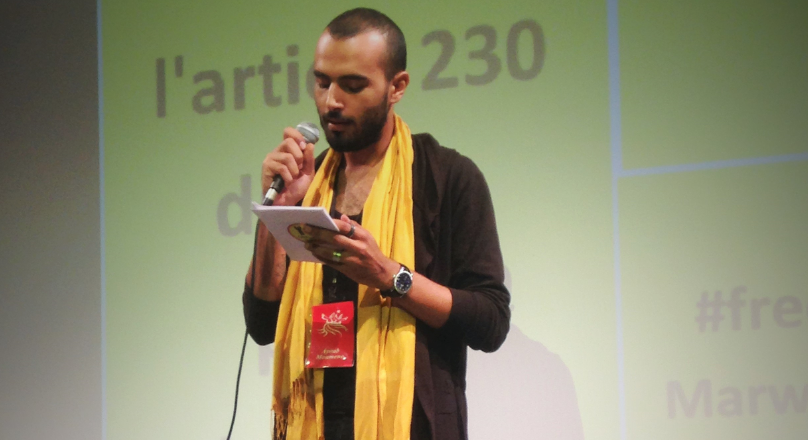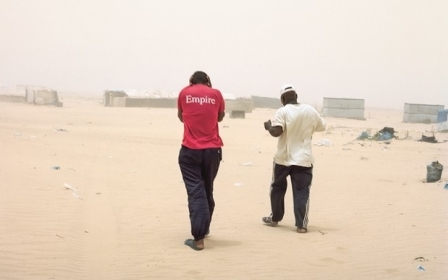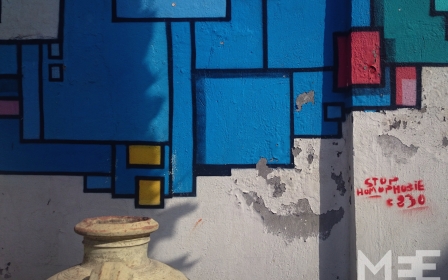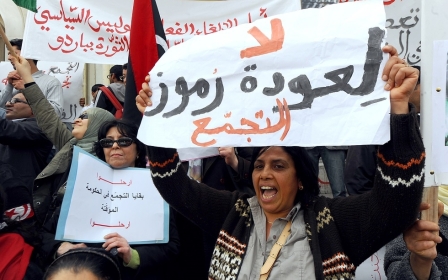Tunisia LGBT group battles for justice in case of imprisoned gay man

Tunisia’s first Lesbian Gay Bisexual Transgender (LGBT) organisation on Saturday gathered together to protest against the arrest and unlawful anal examination of a 22-year-old gay man in the resort town of Sousse.
Filling the seats of a cultural centre in La Marsa, an upper class suburb of Tunis, approximately 100 members of the Shams group hosted a conference, in which civil society activists, lawyers, human rights experts, and other noteworthy individuals shared their ideas for how to best assist the imprisoned man.
Although the activists expressed outrage at the situation for the jailed man, they expressed belief that this incident could serve as a key moment in the push for more equality for sexual minorities.
The Shams organisation began the conference by updating the public on what knowledge they have about the situation. They referred to the arrested man by his pseudonym Marwen. On 6 September, authorities called Marwen in for questioning about the murder of a 53-year old man in Sousse, since they had found Marwen’s number in the man’s cell phone history.
Before heading to the police station, Marwen made sure to call one of his friends, who insisted that he accompany him to the station. The friend, who remains anonymous for his safety, sat outside the interrogation room while police questioned Marwen. According to Marwen’s friend, after quickly realising Marwen was not involved in the murder, “the police began asking him if he had homosexual relations with the older deceased man.”
Marwen refused to admit to these allegations, which only frustrated the police. Marwen’s friend then heard a loud slap of a hand on a wooden table, and then one of the officers could be heard saying, “Okay you want to do it that way? Take off your pants.”
After this, Marwen’s friend left the police station and when he came back later, the police told him his friend “had been arrested and jailed and that was all”. For days this friend and the man’s family tried to assist Marwen, hoping to offer him food and clothes.
Not until the fifth day was his friend allowed to see Marwen. He brought him food and noticed that Marwen “appeared to be in a very fragile state of mind”.
His lawyer, Fedwa Barahm, is now able to visit Marwen two to three times per week, while his family visits and talks with him every Monday. He is currently serving a one-year prison sentence for violation of Article 230, a law banning sodomy, with hope that he will be released early and the guilty verdict will be reversed.
Going public
Marwen’s story has struck a deep chord among LGBT activists, however, according to Dr Amna Guellali, director of Human Rights Watch in Tunisia, “his story is all too familiar,” where over 10 gay men have been killed in hate crimes since the 2010-2011 revolution. What makes Marwen’s story so different is the fact that it has become public – activists have campaigned tirelessly and managed to make the case widely known across Tunisia.
At the Shams event on Saturday, all participants rallied around the same goal: to abolish Article 230, the law that was first established by colonial French authorities in 1913. Displays of opposition to the article varied, ranging from verbal declarations to theatrical performances to short films.
One film, which was directed by Ayoub Moumene and starred Aymen Mejri, depicted a gay character defecating in a toilet, wiping his behind with a paper showing "230", and then flushing it down the toilet. Later in the day, Abderazek Selmi, a prominent member of Damj, a Tunisian rights group that works partly on LGBT rights, told people who support the article to “shove it up their asses just like in the film”.
Organisations like Shams and Damj face difficult obstacles in navigating Tunisian culture and society. Many conservative Tunisians identify gay rights with a Western agenda. They believe that these LGBT groups demand full marriage equality right away. Bel Hedi Bouhdid, director of external relations for Shams, responded by rhetorically asking, “How can we ask for that if we don’t even have basic rights?”
'I'm just like that'
The culture of masculinity also remains difficult to break down or even make more flexible. Rayen Gharbi performed a dramatic piece in which he imitated different homophobic micro-aggressions experienced in the life of a gay man in Tunisia. He mimicked, “Don’t speak with your hands... Where’s your girlfriend?... Why don’t you watch football?” He then ended the piece by finishing with his own voice: “Mom, I’m just like that.”
Human rights lawyer and member of Our Constitution group Dalila Msadeq echoed his sentiments by sharing her knowledge of what it is like to represent clients accused of homosexual acts. “Judges give those lawyers mean looks.” She believes these judges feel that homosexuality threatens their ideas of manhood and manly power.
Aside from LGBT activists, other segments of society have also expressed their condemnation of Marwen’s arrest. The National Council of the Medical Association of Tunisia condemned the actions of the doctor responsible for the anal examination, stated that they are contemplating an investigation due to malpractice, and confirmed that they are against non-consensual treatment of patients.
Tunisia’s Minister of Justice Mohamed Salah Ben Aissa recently stated his opposition to the man’s arrest, noting in an interview with a local radio station his belief that “Article 230 is the problem. Since the adoption of the new constitution, authorities cannot violate individual liberties, privacy, or personal choices, even those concerning sex”.
Clash of views
Saturday’s conference also brought together two former foes in the battle for LGBT rights. Tunisian Femen activist Amina Sboui, famous for posting topless photos on the internet in protest against misogyny, delivered remarks about her own belief that there is “no verse in the Quran which condemns homosexuality”. She expressed her hope that Tunisia becomes the “first Arab-Muslim country to outlaw homophobia”.
In contrast, Salafi preacher Adel Alami tried to enter the conference, but was asked to leave since his name was not on the guest list. The man, who, two years ago, called for the stoning to death of Amina, refused to leave and had to be escorted out by security. Two and a half hours after the event began, Alami could be seen standing outside, speaking with reporters.
The conference closed with Shams and other LGBT activists stating their belief that Marwen’s case could serve as a catalyst to build support against homophobia in Tunisia. In the upcoming months, these activists hope to move the protest into the streets of both Tunis and Sousse, demanding politicians give justice to Marwen.
New MEE newsletter: Jerusalem Dispatch
Sign up to get the latest insights and analysis on Israel-Palestine, alongside Turkey Unpacked and other MEE newsletters
Middle East Eye delivers independent and unrivalled coverage and analysis of the Middle East, North Africa and beyond. To learn more about republishing this content and the associated fees, please fill out this form. More about MEE can be found here.




